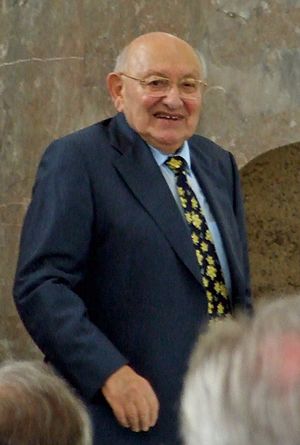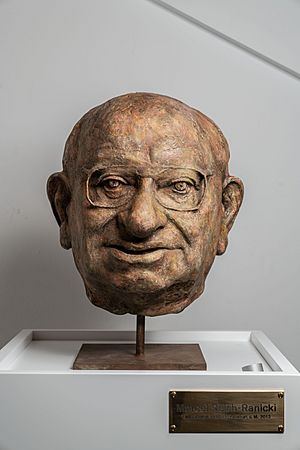Marcel Reich-Ranicki facts for kids
Quick facts for kids
Marcel Reich-Ranicki
|
|
|---|---|

Reich-Ranicki in 2007
|
|
| Born | Marceli Reich 2 June 1920 Włocławek, Kuyavia, Poland |
| Died | 18 September 2013 (aged 93) Frankfurt, Hesse, Germany |
| Occupation | Literary critic |
| Notable awards | Goethe Prize (2002) |
| Spouse |
Teofila
(m. 1942; died 2011) |
Marcel Reich-Ranicki (born June 2, 1920 – died September 18, 2013) was a very famous literary critic from Germany. He was born in Poland. Many people called him the Literaturpapst, which means "Pope of Literature." This shows how important he was in the world of German books. He was known for his strong opinions and for helping many people discover new books.
Contents
Life Story
Early Years and Challenges
Marcel Reich was born on June 2, 1920, in Włocławek, Poland. His father was a Polish Jewish merchant, and his mother came from a German Jewish family. In 1929, Marcel and his family moved to Berlin, Germany. He loved reading German classic books and enjoyed theater. One critic said he "found his salvation in literature."
Because he was Jewish, Marcel could not go to university in Berlin. In 1938, he was sent back to Poland. He later wrote in his autobiography, The Author of Himself, that he had a ticket for a play that evening, but he wouldn't need it.
In November 1940, Marcel and his parents were forced into the Warsaw Ghetto. This was a small area in Warsaw where Jewish people were made to live by the Nazis. Marcel worked there as a main translator for the Judenrat, which was the Jewish council. He also wrote about music for a newspaper called Gazeta Żydowska. His translation work meant he saw meetings between Jewish and Nazi officials.
Marcel and his wife, Teofila, survived the terrible events in the Warsaw Ghetto. They got married there. Sadly, his parents and brother were killed in the Holocaust, especially at the Treblinka extermination camp. In 1943, Marcel and Teofila managed to escape the Ghetto. His sister survived because she had gone to England before the war started.
In 1944, Marcel joined the Polish People's Army. He became an officer in the secret police of Soviet-controlled Poland, called Urząd Bezpieczeństwa. There, he worked in the censorship department. After the war, he joined the communist Polish Workers' Party.
From 1948 to 1949, he worked as a Polish diplomat and intelligence officer in London. He used the secret name "Ranicki." His only child, Andrew Ranicki, was born in London in 1948. Andrew later became a famous mathematics professor. In 1949, Marcel was called back from London. He was fired from the intelligence service and kicked out of the Party. They said he had "ideological estrangement," and he was even jailed for a short time. After this, he became an editor and writer, focusing on German literature.
Life in Germany
Marcel felt limited in Poland. So, in 1958, he moved with his wife and son to West Germany. They lived in Hamburg. There, he started writing for important German newspapers like Die Welt and the Frankfurter Allgemeine Zeitung. In Poland, he had used "Ranicki" as his secret name. The arts editor of the Frankfurter Allgemeine suggested he use it professionally. So, he became Marcel Reich-Ranicki. From 1963 to 1973, he was the main literary critic for the German weekly newspaper Die Zeit.
In 1973, he moved to Frankfurt. From 1973 to 1988, he led the literature team at the daily Frankfurter Allgemeine Zeitung. He continued to write for this newspaper for the rest of his life. He also taught at universities in America, Stockholm, and Uppsala.
He received many honorary degrees from universities. For example, in 1974, he became an honorary professor at the University of Tübingen. In 2007, the Humboldt University in Berlin gave him an honorary degree. This was special because in 1938, this same university had refused his application because he was Jewish.
From 1988 to 2001, Reich-Ranicki hosted a popular TV show called Literarisches Quartett. On this show, he and other critics talked about books. He became very famous in Germany because of it. A survey showed that 98% of Germans knew his name! After that show, he had a shorter program called Reich-Ranicki Solo, where he talked about books to an audience.
In 1993, a magazine called Der Spiegel wrote a long article about him, calling him "The Lord of Books." Many writers and readers sometimes disagreed with his strong opinions. However, everyone recognized his deep knowledge and love for German literature.
Marcel wrote about German literature for most of his life. Later, he also wrote books about American and Polish literature. His wife and son encouraged him to write his life story. In 1999, his autobiography, The Author of Himself: The Life of Marcel Reich-Ranicki, became a bestseller in Germany. This book mostly talked about his life and survival during the war. It was even made into a TV show in 2009.
In 2008, he received a special award for his lifetime achievements in German television. During his acceptance speech, he surprised everyone by criticizing the state of German television. He said he would have given back any money that came with the award.
In 2012, Reich-Ranicki gave an important speech at the Bundestag (German parliament) on International Holocaust Remembrance Day. He continued to write a weekly column for the Frankfurter Allgemeine Zeitung until shortly before he passed away.
His autobiography, "The Author of Himself," starts with a conversation from 1958. A writer named Günter Grass asked him, "Are you German, or Polish, or what?" Marcel answered, "Half German..."
Family Life and Legacy
Marcel Reich-Ranicki passed away on September 18, 2013, in Frankfurt. He had been diagnosed with prostate cancer. The German Chancellor, Angela Merkel, said that Germany lost "a peerless friend of literature, but also of freedom and democracy." She added, "I will miss this passionate and brilliant man." The newspaper Süddeutsche Zeitung wrote that he was "the man who taught us how to read."
Marcel's son, Andrew Ranicki (1948–2018), was a mathematics professor at the University of Edinburgh. Marcel's wife, Teofila, died two years before him, in 2011. Marcel appreciated Jewish culture, especially its way with words. However, he found religion pointless and, after his experiences in Warsaw, he could not believe in God.
Key Works
Marcel Reich-Ranicki wrote many books and articles. His most famous book is:
- Mein Leben (My Life), published in 1999. This book is also known as The Author of Himself: The Life of Marcel Reich-Ranicki. It tells his life story, especially his experiences during World War II.
He also edited many collections of German literature, like:
- Frankfurter Anthologie (Frankfurt Anthology), a series of books with poems and their interpretations.
- Der Kanon. Die deutsche Literatur Erzählungen (The Canon. German Literature Stories), a large collection of important German stories.
He also wrote books about specific authors and literary topics, and many of his TV show discussions were published as books.
Images for kids
See also
 In Spanish: Marcel Reich-Ranicki para niños
In Spanish: Marcel Reich-Ranicki para niños



